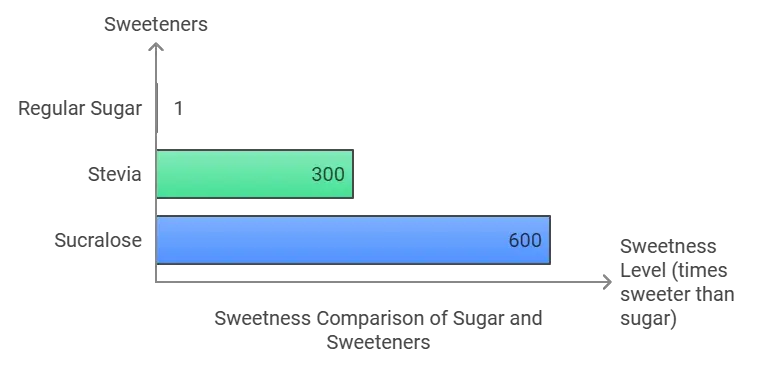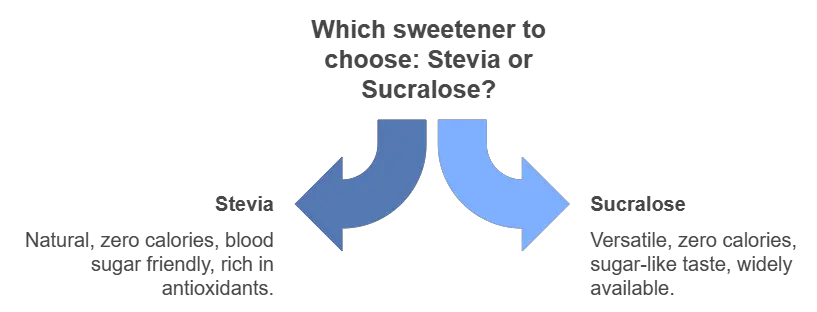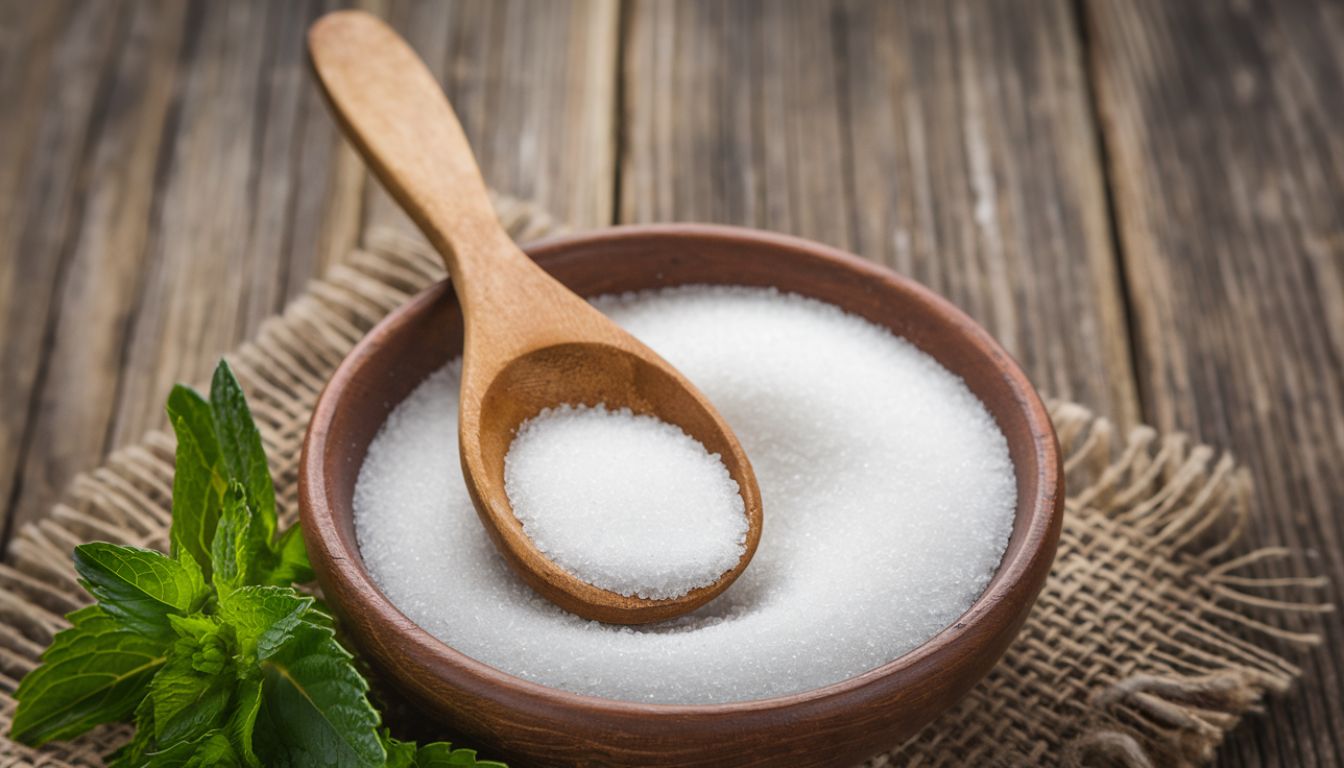When it comes to sweeteners, the stevia versus sucralose debate often sparks lively discussion, much like the classic pineapple-on-pizza argument. Stevia is the natural option, derived from the leafy Stevia plant and valued for its long history of use. Sucralose, on the other hand, is a lab-created sweetener known for delivering intense sweetness without the added calories.
Whether you’re a health-conscious baker looking to cut sugar or just someone trying to sweeten your morning coffee without the guilt, understanding the differences between these two options can help you make informed choices. So, let’s dive into the sweet details and see how these two contenders measure up!
Benefits of Sucralose – Stevia vs Sucralose
Imagine being able to enjoy the sweetness of sugar without any of the calories—sounds like a dream, right? Well, that’s exactly what sucralose offers! With its zero-calorie profile, it’s a go-to choice for anyone looking to satisfy their sweet tooth without the guilt. Whether you’re stirring it into your morning coffee or using it to whip up a batch of cookies, sucralose lets you indulge without the calorie baggage.
Drawbacks of Sucralose
While sucralose has its perks, it’s not without a few quirks that might give some people pause. One common complaint is the aftertaste, which some describe as slightly artificial or chemical. For those sensitive to taste, this can be a real buzzkill. Additionally, there are concerns about sucralose’s impact on gut health. Some studies suggest it may alter the gut microbiome, potentially leading to digestive issues. And let’s not forget that sucralose is a synthetic sweetener; while it helps cut calories, it doesn’t provide any nutritional benefits.
Exploring Stevia – Stevia vs Sucralose
Origin and Production
Stevia is a natural sweetener extracted from the leaves of the Stevia plant, native to South America. The extraction process involves isolating the sweet compounds, known as steviol glycosides, which are then used in various food products. Stevia has been utilized for centuries in traditional cultures for its sweetening properties, and its natural origin appeals to those seeking plant-based alternatives.
Benefits of Stevia
Stevia’s natural composition is one of its most appealing features, particularly if you prefer plant-based products. It is also environmentally friendly, with a minimal carbon footprint compared to synthetic sweeteners. Furthermore, stevia does not affect blood sugar levels, making it a suitable option for individuals with diabetes or those monitoring their glucose intake.
Drawbacks of Stevia
However, stevia is not without its challenges. Some people find its aftertaste slightly bitter, reminiscent of licorice, which may not be to everyone’s liking. Additionally, its intense sweetness requires precise measurement to achieve the desired taste in recipes, which can be a challenge for those unfamiliar with its potency.
Culinary Uses and Tips – Stevia vs Sucralose
Getting Creative with Stevia and Sucralose
When it comes to sweetening your favorite dishes, both stevia and sucralose can be your trusty sidekicks in the kitchen. If you’re ready to embark on a culinary journey, let’s dive into how to use these sweeteners effectively, ensuring your meals are both delicious and guilt-free!
Baking with Stevia: A Sweet Science

Baking with stevia can feel a bit like a chemistry experiment. Since it’s much sweeter than sugar—up to 300 times sweeter, in fact—you’ll want to tread lightly. To substitute stevia in baking, a general rule of thumb is to use about one teaspoon of liquid stevia for every cup of sugar. If you’re using powdered stevia, check the packaging for specific conversion rates, as they can vary.
But here’s where it gets fun! Stevia doesn’t caramelize like sugar, so if you’re making cookies or cakes that rely on that golden-brown goodness, you might want to mix it with a bit of sugar or another sweetener to achieve that perfect texture. Consider whipping up a batch of stevia-sweetened banana bread. Just mash those ripe bananas, toss in some stevia, and watch as your kitchen fills with the delightful aroma of baking goodness.
Cooking with Sucralose: Sweetness Under Heat
Now, let’s talk about sucralose. Its heat stability makes it a superstar in the kitchen, especially for recipes that require cooking or baking. You can use sucralose in savory dishes, too! Imagine making a tangy barbecue sauce for grilled chicken; just swap out the sugar for sucralose, and you’ll get that sweet-and-tangy kick without the calories.
When substituting sucralose for sugar, remember that it’s about 600 times sweeter. So, just a pinch can go a long way! If a recipe calls for one cup of sugar, you’ll only need about one tablespoon of sucralose.
Taste Testing: The Sweet Showdown
Now, here’s a fun idea: why not host a taste test party? Invite your friends or family over for a sweet showdown! Prepare a few dishes—maybe some cookies, a smoothie, or even a classic lemonade—and use stevia in one batch and sucralose in another. As everyone samples the goodies, ask them to share their thoughts on the flavors.
This interactive experience not only sparks conversations about flavor preferences but also helps you discover which sweetener works best for different recipes. You might find that stevia shines in your morning smoothie, while sucralose is the star of your evening dessert. Plus, it’s a great way to break the ice and have some laughs over who prefers what—after all, taste is subjective, and everyone has their own sweet spot (pun intended haha)!
Long-Term Health Studies On Stevia vs Sucralose

Peering into the Future – Stevia vs Sucralose
When it comes to sweeteners like stevia and sucralose, the conversation doesn’t just end with taste and convenience; we need to talk about what they might be doing to our bodies in the long run.
Recent studies have sparked some interesting discussions. For instance, research has shown that sucralose may have an impact on gut health. Some studies suggest that it can alter the gut microbiome. While regulatory bodies deem sucralose safe for consumption, the ongoing debate about its long-term effects keeps the scientific community on its toes.
On the flip side, stevia is often hailed for its natural origins and potential health benefits. Some studies suggest that stevia might even help lower blood pressure and improve insulin sensitivity. However, more research is needed to fully understand these effects and how they play out over the long haul.
Expert Opinions – Stevia vs Sucralose
To add a sprinkle of credibility to our sweetener saga, let’s turn to the experts. Nutritionists and dietitians are like the wise sages of the food world, offering insights that can guide us through the maze of health information. For example, registered dietitian Sarah Johnson notes, “While both stevia and sucralose can be useful in reducing sugar intake, it’s essential to consider individual health goals and how your body reacts to each sweetener. Some people may find stevia more appealing because of its natural origins, while others might prefer the convenience of sucralose in baking.”
Another expert, Dr. Mark Thompson, a nutrition researcher, adds, “It’s crucial to remember that moderation is key. Both sweeteners can be part of a balanced diet, but understanding their long-term effects is still a work in progress. Listening to your body and paying attention to how you feel after consuming these sweeteners can provide valuable feedback.”
Myths and Misconceptions: Setting the Record Straight

The Sweet Truth About Artificial Sweeteners
When it comes to sweeteners like stevia and sucralose, there’s a lot of chatter out there, and not all of it is based on facts. Let’s take a moment to clear the air and debunk some of the most common myths surrounding these two sweeteners.
Myth #1: All Artificial Sweeteners Are Harmful
First up, the big one: the belief that all artificial sweeteners are harmful. While it’s true that some folks have concerns about synthetic ingredients, labeling all artificial sweeteners as dangerous is a bit like saying all fast food is bad for you. Sucralose, for instance, has been extensively studied and deemed safe for consumption by health authorities around the world. It’s important to remember that moderation is key. Enjoy it, but don’t make it a daily habit!
Myth #2: Stevia Is Only for Certain Diets
Next, let’s tackle the misconception that stevia is only suitable for certain diets, like keto or paleo. While stevia is indeed a favorite among those watching their carbs or sugar intake, it’s not exclusive to just those groups. Think of stevia as the versatile friend who can fit in anywhere—whether you’re vegan, gluten-free, or just someone who enjoys a little sweetness in their life. It’s a natural sweetener that can be enjoyed by anyone looking to cut back on sugar without sacrificing flavor.
Myth #3: Stevia Tastes Like Medicine
Ah, the taste debate! Some people believe that stevia has a bitter or medicinal aftertaste. While it’s true that taste is subjective, it’s a bit like saying all coffee is bitter—there are so many varieties and preparations out there! Many brands have refined their extraction processes to minimize any unpleasant aftertaste, and when used correctly, stevia can enhance flavors beautifully. It’s all about finding the right product and using it in the right way. So, if you’ve tried stevia before and weren’t a fan, it might be worth giving it another shot with a different brand.
Myth #4: Sucralose Is Just Like Sugar
Here’s a fun one: the idea that sucralose is just like sugar. While it’s true that sucralose is designed to mimic sugar’s sweetness, it’s important to remember that it’s still a synthetic compound. It’s like comparing apples to oranges—both are sweet, but they come from different trees! Sucralose doesn’t provide the same nutritional benefits as sugar, and it doesn’t contribute to energy in the same way. So, while it can be a great tool for reducing calories, it doesn’t replace the nutrients found in whole foods.
Making an Informed Choice – Before You Go – Stevia vs Sucralose
Aligning Sweetener Choice with Health Goals
Choosing between sucralose and stevia involves considering personal health goals and dietary needs. Those prioritizing weight management may lean towards sucralose due to its calorie-free nature, while those seeking natural options might prefer stevia for its plant-based origin and minimal impact on blood sugar levels.
Personal Preferences and Lifestyle
Taste preferences and culinary applications are crucial factors in the decision-making process. Additionally, consumers motivated by sustainability and ethical considerations may find stevia more aligned with their lifestyle. The choice of sweetener should reflect an individual’s overall health objectives, taste preferences, and commitment to environmental and ethical values. Don’t forget to add The Herb Prof to your favorites so you don’t miss out any new articles!
References – Stevia vs Sucralose
Little Herb Encyclopedia, by Jack Ritchason; N.D., Woodland Publishing Incorporated, 1995
The Ultimate Healing System, Course Manual, Copyright 1985, Don Lepore
Planetary Herbology, Michael Tierra, C.A., N.D., Lotus Press, 1988
Handbook of Medicinal Herbs, by James A. Duke, Pub. CRP Second Edition 2007
The Complete Medicinal Herbal, by Penelope Ody, Published by Dorling Kindersley
Check the Following Articles!
African Violet Medicinal Uses: Discover the Healing Power
Red Cabbage Microgreens: How to Grow in Easy Steps
